Recommended Resources
GH5050 How-To: Develop Family-Friendly Workplace Policies
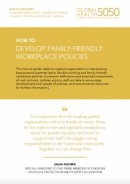
This guide seeks to support organisations in developing best-practice parental leave, flexible working and family-friendly workplace policies. It presents definitions and essential components of such policies, outlines actions staff can take to encourage development and uptake of policies, and recommends resources for further information.
DOWNLOAD THE PDF
GH5050 How-To: Measure and Address the Gender Pay Gap
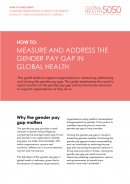
This guide seeks to support organisations in measuring, addressing and closing the gender pay gap. The guide emphasises the need to report and act on the gender pay gap and recommends resources to support organisations as they do so.
DOWNLOAD THE PDF
GH5050 How-To: Develop A Comprehensive Sexual Harassment Policy
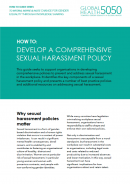
This guide seeks to support organisations in developing comprehensive policies to prevent and address sexual harassment in the workplace. It identifies the key components of a sexual harassment policy and presents a number of best practice policies and additional resources on addressing sexual harassment.
DOWNLOAD THE PDF
Global Health 50/50 2019 Report Slides

This slide deck provides a quick, accessible summary of the main findings from the Global Health 50/50 2019 Report: Equality Works and can be used to present the Report findings.
DOWNLOAD THE SLIDES
Global Health 50/50 Methods Guide
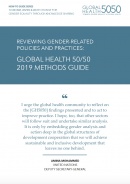
This guide provides an overview of the methodology of the GH5050 2019 Report, Equality Works, and further aims to support users in applying the GH5050 approach to monitoring gender-related organisational performance.
DOWNLOAD THE PDF
Assess your organisation: Global Health 50/50 2019 Organisational Self-Assessment
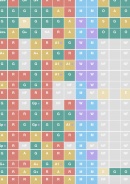
This Self-Assessment is aligned with the framework of the GH5050 2019 Report Equality Works. It aims to support organisations that were not reviewed in Equality Works, yet are interested in assessing their own performance on gender and gender equality.
Organisations are invited send this completed form to Global Health 50/50 (info@globalhealth5050.org) for publication on its site.
ACCESS THE ONLINE FORM
Global Health 50/50 Report 2018

The Global Health 50/50 Report, the first of its kind, provides a comprehensive review of the gender-related policies of more than 140 major organisations working in and/or influencing the field of global health. It provides a benchmark across the sector to catalyse shifts in organisational and management culture and practice, the adoption of gender-responsive policies, and ensuring adequate resources for programmes focusing on the gendered dynamics of global health.
DOWNLOAD THE PDF
Global Health 50/50 Report 2019: Equality Works
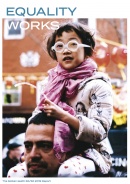
The Global Health 50/50 2019 report focuses on gender equality in the workplace, reviewing policies, programmes, and indicators of power and privilege across 198 organisations. It provides an in-depth look at gender equality within the workplace across four dimensions: commitment, evidence-informed policy content, equitable outcomes in power and pay, and gender-responsive programming.
DOWNLOAD THE PDF
Celebrating Change: Organisational Commitments Towards Gender-Responsive Policies and Practices
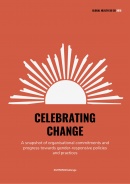
In response to Global Health 50/50 findings and recommendations, global organisations are making commitments, taking action and sharing progress on how they are improving gender-related policies and practices. The Celebrating Change brochure (November 2018) provides a snapshot of organisational commitments and progress towards gender-responsive policies and programmes.
DOWNLOAD THE PDF
The Gender Pay Gap: Briefing Paper
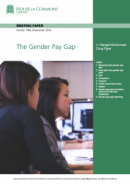
VISIT SITE | DOWNLOAD PDF
Fairygodboss: Elevating Women at Work

Fairygodboss offers a women’s career community, expert career advice, job openings and company reviews to help women advance their careers. The site aims to help women find female-friendly workplaces.
VISIT SITE
Towards an End to Sexual Harassment: The Urgency and Nature of Change in the Era of #metoo
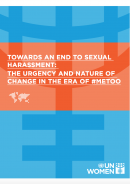
This publication is not intended to be a comprehensive document on sexual harassment. It is one of a number of documents published by UN Women intended to support policy makers, employers and activists by offering new guidance on policy and practice on sexual harassment.
VISIT SITE I DOWNLOAD PDF
UN System Model Policy on Sexual Harassment
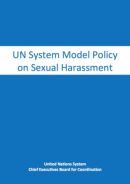
In 2018, the UN published a model policy on sexual harassment. This policy provides a clear guide for organisations to develop their own sexual harassment policies. This is a gold-standard policy model, the core elements of which are also outlined on page 97 of the Global Health 50/50 2019 Report.
VISIT SITE I DOWNLOAD PDF
Gender Inclusive Language
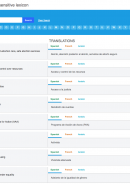
UN Women, recognising the importance of language, provides a multi-language guide to gender-inclusive terminology. Their searchable gender-inclusive lexicon below includes some 650 entries in Arabic, English, French and Spanish. This section of their website also provides helpful guidelines in English, French and Spanish which explore how to promote gender equality through the use of language.
VISIT SITE
Gender-Responsive Assemblies: An agenda for concrete action
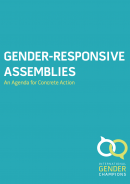
The International Gender Champions developed this toolkit to support all actors that drive change within organisations, including Director-/Secretary-Generals, Secretariats, Member States, civil society and staff. It is essential for gender-responsive change that the spaces for international agenda setting advance gender equality and that the assemblies themselves offer an enabling and inclusive environment.
VISIT SITE I DOWNLOAD PDF
Corporate Equality Index 2020: Rating Workplaces on Lesbian, Gay, Bisexual, Transgender, and Queer Equality
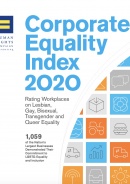
The Human Rights Campaign Foundation launched the Corporate Equality Index (CEI) in 2002. It is first internationally recognized benchmarking report for businesses to gauge their level of LGBTQ workplace inclusion against competitors. The CEI covers Fortune magazine’s 500 largest publicly traded businesses, American Lawyer magazine’s top 200 revenue-grossing law firms (AmLaw 200) and hundreds of publicly and privately held mid- to large-sized businesses.
VISIT SITE I DOWNLOAD PDF
Women in the Workplace 2018
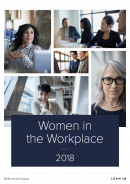
Companies report that they are highly committed to gender diversity. But that commitment has not translated into meaningful progress. Progress isn’t just slow. It’s stalled. This is the central finding of Women in the Workplace 2018, a study conducted by McKinsey & Company in partnership with LeanIn.Org. In the fourth year of its ongoing research, the report draws on data from 279 companies employing more than 13 million people. Women in the Workplace 2018 is the largest comprehensive study of the state of women in corporate America.
VISIT SITE I DOWNLOAD PDF
INLPR 2018 Annual Review of National Leave Policies
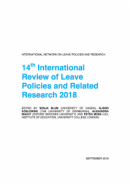
Since 2004, the International Network on Leave Policies & Research has produced an annual review of leave policies and related research. The review covers maternity, paternity and parental leaves; leave to care for sick children and other employment-related measures to support working parents; and early childhood education and care policy. The 2018 review presents reports for 43 countries. The site further provides definitions for different leave policies, as well as comparative analyses of country leave policies.
VISIT SITE I DOWNLOAD PDF
Find, compare and learn about gender pay gap data in the UK
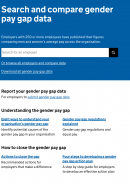
The UK government requires organisations with more than 250 organisations to report their gender pay gap data (women and men’s average pay across the organisation). The UK Gender pay gap website allows you to find and compare gender pay gap information reported by employers, and learn more about the gender pay gap and how to close it.
VISIT SITE
Gender pay gap guidance: Managing gender pay reporting
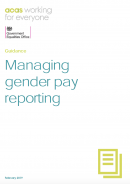
This 2019 guide prepared by Acas and the UK Government Equalities Office offers employers, senior managers, line managers, HR personnel and and any other staff or policy-makers an explanation of what the gender pay gap is, and how to report on it in compliance with UK legislation. It also offers insight into the business benefits of taking effective action to address the challenges identified by analysing and reporting your gap.
VISIT SITE I DOWNLOAD PDF
PL+US paid family leave resources and company scorecard
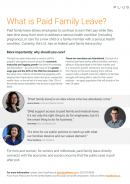
The PL+US initiative aims to transform workplaces, public policies and culture to secure high-quality paid family leave for everyone. The initiative provides a number of short, evidence-informed issue briefs on the issue of paid family leave, including why it matters, links to women’s economic empowerment and messages that resonate with policy-makers. PL+US also provides a ranking of top US employers’ paid family leave policies.
VISIT SITE
State of the World’s Fathers 2017: Time for Action

State of the World’s Fathers: Time for Action is the second State of the World’s Fathers report, following the first-ever edition published in 2015. The first State of the World’s Fathers report presented a comprehensive global overview of trends related to equal care-giving, among other linked dynamics. It further synthesized various global data sources on related topics – unpaid care work, sexual and reproductive health and rights, maternal health, men’s violence against women, and child development. Developed by Promundo on behalf of MenCare, the 2017 report provides an update of recent policy change in several countries as well as remaining challenges, and proposes a set of priority areas for action.
VISIT SITE I DOWNLOAD PDF
Maternity and paternity at work: Law and practice across the world
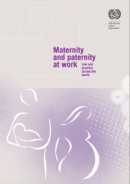
This 2014 report from the International Labor Organization reviews national law and practice on both maternity and paternity at work across the world. Rights and practices that recognize the fundamental need and responsibility for parenthood of both women and men are mutually reinforcing and crucial for the achievement of equal opportunity. The report is based on an extensive set of legal and statistical indicators, including coverage in law and in practice, which provide a global and regional review of national legislation and practices as well as their evolution over the previous 20 years.
DOWNLOAD PDF
Global Gender Gap Report 2018
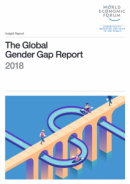
The Global Gender Gap Index was first introduced by the World Economic Forum in 2006 as a framework for capturing the magnitude of gender-based disparities and tracking their progress over time. The 2018 edition of the report benchmarks 149 countries on their progress towards gender parity on a scale from 0 (disparity) to 1 (parity) across four thematic dimensions—the subindexes Economic Participation and Opportunity, Educational Attainment, Health and Survival, and Political Empowerment—and provides country rankings that allow for effective comparisons across and within regions and income groups.

